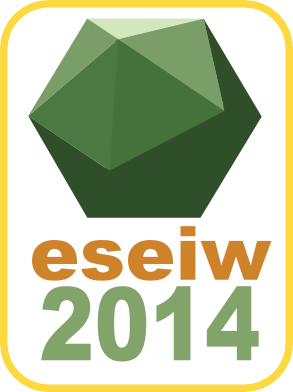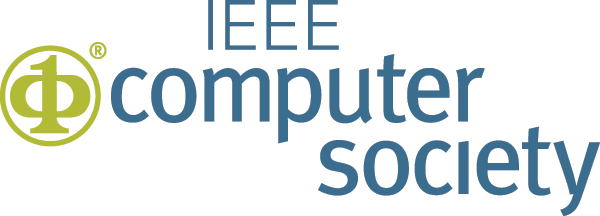esem 2014
List of Accepted Papers
Full papers track
The following 23 papers have been accepted (acceptance rate = 18.7%):
- (17)
What Do Game Developers Test in Their Products? - (18)
Impact of Process Conformance on the Effects of Test-driven Development - (22)
Comparing and Contrasting Model-Driven Engineering at Three Large Companies - (27)
Debsources: Live and Historical Views on Macro-Level Software Evolution - (33)
On Knowledge Transfer Skill in Pair Programming - (34)
Improving Requirements Glossary Construction via Clustering: Approach and Industrial Case Studies - (41)
How is Exploratory Testing Used? A State-of-the-Practice Survey - (42)
Using Templates to Elicit Implied Security Requirements from Functional Requirements − A Controlled Experiment - (45)
Discovering Buffer Overflow Vulnerabilities In The Wild: An Empirical Study - (49)
Engineering of Quality Requirements as Perceived by Near-shore Development Centres’ Architects in Eastern Europe: the Hole in the Whole - (52)
The Impact of Test Ownership and Team Structure on the Reliability and Effectiveness of Quality Test Runs - (59)
FixerCache: Unsupervised Caching Active Developers for Diverse Bug Triage - (65)
An Empirical Simulation-based Study of Real-Time Speech Translation for Multilingual Global Project Teams - (69)
How do Code Refactorings Affect Energy Usage? - (86)
A Controlled Experiment to Evaluate the Effects of Mindfulness in Software Engineering - (112)
The Role of Mentoring and Project Characteristics for Onboarding in Open Source Software Projects - (115)
What's in a Bug Report? - (117)
Tracing Back the History of Commits in Low-tech Reviewing Environments - (121)
Measuring Shared Understanding in Software Project Teams using Pathfinder Networks - (124)
Impact of Developer Reputation on Code Review Outcomes in OSS Projects: An Empirical Investigation - (130)
Motivated software engineers are engaged and concentrated, while satisfied ones are happy - (137)
Forking and coordination in multi-platform development: a case study - (148)
A Qualitative Analysis of Software Build System Changes and Build Ownership Styles
Short-papers track
The following 24 papers were accepted (acceptance rate = 42.1%)
- (181)
Evaluating strategies for study selection in systematic literature studies - (215)
Towards a Framework to Support Large Scale Sampling in Software Engineering Surveys - (191)
Impacts of Design Pattern Decay on System Quality - (208)
Evolution of Design Patterns: a Replication Study - (214)
Sampling Improvement in Software Engineering Surveys - (228)
An Approach for Effort Estimation in Incremental Software Development using Cosmic Function Points - (229)
Support Mechanisms to Conduct Empirical Studies in Software Engineering - (167)
Productivity for proof engineering - (169)
Bridging the Gap: SE Technology Transfer into Practice - Study Design and Preliminary Results - - (178)
A replicated study on duplicate detection: Using Apache Lucene to search among Android defects - (185)
Simple Empirical Cost Estimation Model - (189)
Writing for Synthesis of Evidence in Empirical Software Engineering - (192)
Estimation of Student’s Programming Expertise - (210)
Software Population Pyramids: The Current and the Future of OSS Development Communities - (221)
A Systematic Mapping Study on Testing Technique Experiments: Has the Situation Changed since 2000? - (222)
Design Pattern Decay: The Case for Class Grime - (165)
Monitoring Bottlenecks in Achieving Release Readiness – A Retrospective Case Study across Ten OSS Projects - (166)
ISBSG variables most frequently used for software effort estimation: A mapping review - (171)
The use of systematic reviews in Evidence Based Software Engineering: A Systematic Mapping Study - (175)
On The Impact of Passive Voice Requirements on Domain Modelling - (176)
Where Do We Stand in Requirements Engineering Improvement Today? First Results from a Mapping Study - (201)
Using Qualitative Metasummary to Synthesize Empirical Findings in Literature Reviews - (209)
Patterns of Folder Use and Project Popularity: A Case Study of Github Repositories - (217)
Towards a Semantic Knowledge Base on Threats to Validity and Control Actions in Controlled Experiments
Industry track
The following 15 papers have been accepted (acceptance rate = 75%):
- (224)
Factors Impacting Rapid Releases: An Industrial Case Study - (162)
The Effect of Evolutionary Coupling on Software Defects: An Industrial Case Study on a Legacy System - (164)
Mining Energy Traces to Aid in Software Development: An Empirical Case Study - (194)
A Replication Case Study to Measure the Architectural Quality of a Commercial System - (202)
Networking in a Large-Scale Distributed Agile Project - (216)
Effect of Temporal Collaboration Network, Maintenance Activity, and Experience on Defect Exposure - (196)
Evaluation in Practice: Artifact-based Requirements Engineering and Scenarios in Smart Mobility Domains - (219)
Evaluating the TESTAR tool in an Industrial Case Study - (233)
What We Have Learned About the Value of Software Assurance - (173)
Industrial Evaluation of the Impact of Quality-Driven Release Planning - (207)
Security Triage: An Industrial Case Study on the Effectiveness of a Lean Methodology to Identify Security Requirements - (230)
Empirical and Face Validity of Software Maintenance Defect Models Used at the Jet Propulsion Laboratory - (218)
Evaluating Capture and Replay and Model-based Performance Testing Tools: An Empirical Comparison - (200)
Process Mining Can Be Applied to Software Too! - (179)
An UML-based approach to software development cost estimation










